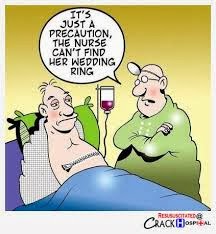1-
Practice the following conversation.
http://youtu.be/Zk1L0m67pfU
Doctor: How are you feeling today?
Patient: Not very well doctor.
Doctor: Tell me about it. (conta'm qué et passa)
Patient: I have a terrible headache.
Doctor:How about (qué tal) your thoat?
Patient: It hurst a little (em fa un poc de mal).
Doctor: Do you have a cough? (Tens tos?)
Patient: Yes, I have a cough too.
CONTINUA TRADUINT LA CONVERÇA I PRACTICA-LA.
2- Now do the same with the following video. LEARN THE FOLLOWING
VOCABULARY.
TO HURT: fer mal
TO WRAP: embenar
TO SCRAPE: fer-se un pelat.
TO CUT: tallar-se
STICHES: punts.
TO STUB: pegar-se un colp.
It just needs to be cleaned.
It+NEEDS to+ Past participle significa hem de netajar-lo
Recorda que WILL és la marca de futur!!!!
It will be fine tomorrow. (Estarà bé demà)
http://youtu.be/ZzsKpmYLM6g
a. What's the doctor's advice for each problem? Practice it writing it down on your notebook. (Quin és el consell del metge per a cada problema. Fes una llista a la llibreta)
3- HOSPITAL VOCABULARY. Now revise and practice the new words.
http://youtu.be/yohJIpm43RE
4- Read and Listen. MIND, BODY and HEALTH.
http://youtu.be/ziyPmiuwtIQ
LOVE, HATE, LIKE....etc són verbs d'agradar o desagradar. Darrere sempre va un verb amb -ING. com
I LOVE WALKING IN THE COUNTRYSIDE. (M'agrada caminar pel camp)
PERÒ I LIKE TO PRACTICE YOGA. (En este cas, practioques yoga , notant perquè t'agrada, sinó perquè ho has de fer, ja siga per motius de salut o perque t'ho has pres com una obligació)
AIXÍ, diríem I LIKE TO GO TO THE DENTIST EVERY YEAR. ( Vas al dentista no perquè t'agrade, sinó perquè ho has de fer)
ME TOO. A mi també.
HOW DO YOU LIKE TO RELAX? (Com t'agrada relaxar-te?)
DO YOU KNOW.....? (Coneixes?)
THEY FEEL REALLY GOOD. ( Senten molt bé.)
I BET. o IT SURE IS; I AGREE, IT DOES, COOL, (Són maneres d'assentir)
IT KEEPS ME FROM sleeping ; ( m'impedeix...dormir)
IT SOUNDS.... (sona...)
AS LONG AS you are not getting too stressed out ( sempre que no estigues massa estressat)
IT SURE DOEN'T SEEM LIKE IT. (No ho sembla)
a. Exercise.Look up in the dictionary the following words.
FAST-PACED PEACEFUL STRESSFUL MOOD ACHE
AWFUL ADVICE HELPFUL UPSET
b. Now answer.
- What can you do to relax?
-Is stress always bad? How can stress help people?
- What do you do to relax?
Quina és la diferència entre la primera pregunta i l'última? La primera es refereix en general (què fa la gent), la segona a què fas tu per a relaxar-te. Ara ja pots contestar.
HAVE A NICE LEARNING SESSION!!!







